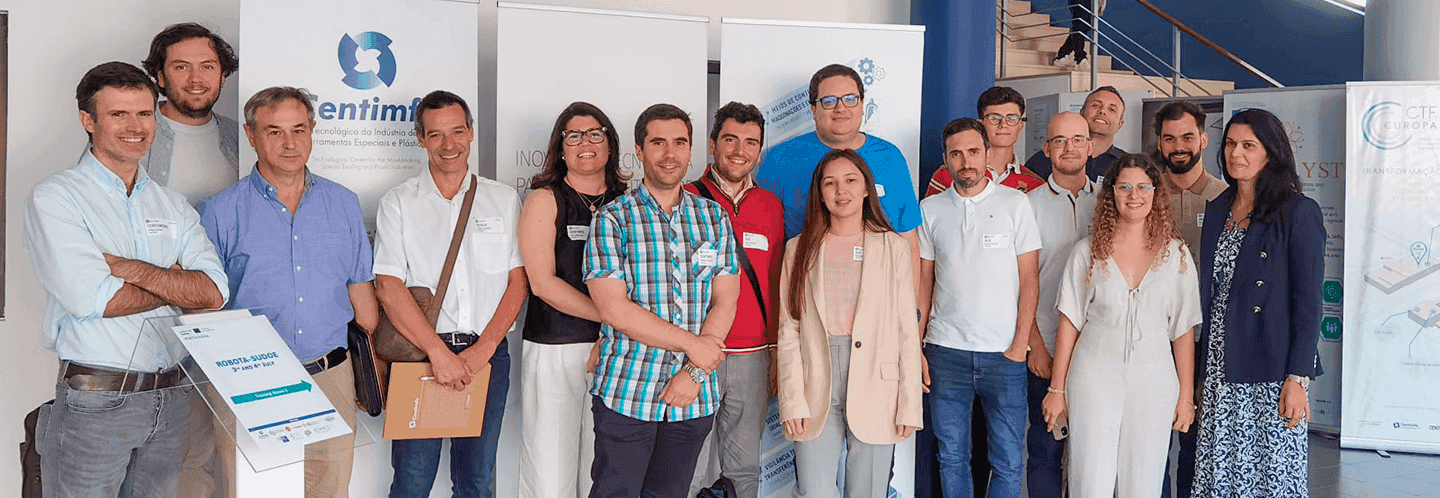
Robotics, digitalisation, and automation converge in ROBOTA-SUDOE, a new project aimed at improving quality of life in rural and artisanal regions of South-Western Europe
CiTIUS researchers Juan Antonio Corrales and Saltanat Seitzhan join the kickoff meeting for the ROBOTA-SUDOE project, a groundbreaking initiative aimed at modernizing economic sectors within the South-Western Europe area (SUDOE) through advanced AI and collaborative robotics.
CiTIUS researchers Juan Antonio Corrales and Saltanat Seitzhan have just participated along the kickoff meeting for the ROBOTA-SUDOE project, an event which took place recently in Portugal. The meeting, celebrated at the headquarters of CENTIMFE (Centro Tecnológico da Indústria de Moldes, Ferramentas Especiais e Plásticos) marked the beginning of a groundbreaking initiative aimed at modernizing the economic sectors within the South-Western Europe area (SUDOE), focusing particularly on the agri-food industry and plastics. A new and significant research challenge that will feature the participation of CiTIUS (Research Centre on Intelligent Technologies of the University of Santiago de Compostela), a center co-financed by the European Union through the Galicia ERDF 2021-2027 Program.
Moving Forward
The primary goal of the ROBOTA-SUDOE project is to enhance the competitiveness and growth of small and medium-sized enterprises (SMEs) through innovative collaborative solutions, by integrating robotics, digitalisation, and automation. With the collective expertise and cooperation of all partners, the project aims to create significant technological advancements that will benefit various industries. These solutions are designed to address local challenges and promote environmental sustainability. By leveraging advanced AI techniques and cutting-edge technologies, the project seeks to bring innovation to traditionally artisanal and less developed territories, thereby improving the quality of life and making the SUDOE space -especially its rural areas-, more attractive and viable.
Juan Antonio Corrales, a leading researcher at CiTIUS, highlighted the importance of the project, stating that “the ROBOTA-SUDOE project represents a crucial step towards technological innovation in traditionally underserved regions. By harnessing advanced AI and collaborative robotics, we aim to not only boost the competitiveness of SMEs but also improve the quality of life in rural areas”. With regard to the role to be played by the University of Santiago de Compostela, Corrales explains that “CiTIUS will contribute to the development and implementation of new robotic applications”.
The project envisions creating a robust network for knowledge exchange and technology transfer to SMEs. “Transnational cooperation is a key element of ROBOTA-SUDOE, as the sectors and challenges addressed are common across borders”, sources from the project say. “The diverse knowledge and skills of the participating entities are complementary, ensuring that joint efforts will lead to more effective and innovative solutions”, they conclude.
Among the expected outputs are the creation of collaborative robots for various applications, such as meat cutting, fruit packaging, and doll assembly. Additionally, the project plans to establish three "living labs" to showcase and promote these solutions across different sectors and SMEs in the region.
Highlights from the Kickoff Meeting
The kickoff meeting provided a platform for partners to discuss the project’s objectives, challenges, and initial actions. Key participants included CENTIMFE (Centro Tecnológico da Indústria de Moldes, Ferramentas Especiais e Plásticos), C-MAST (Center for Mechanical and Aerospace Science and Technologies), Cerfundão (Embalamento e comercialização de cereja da Cova da Beira), AIJU (Instituto Tecnológico de Producto Infantil y Ocio), INDUSTRIA AUXILIAR JUEMA S.L., CiTIUS-USC, Centro Tecnolóxico da Carne, Clermont Auvergne INP, and CIMES.
The event was an opportunity for intellectual exchange and collaboration, setting the stage for the innovative work ahead and underscoring the commitment of every partner on advancing robotics and automation technologies within the SUDOE region.